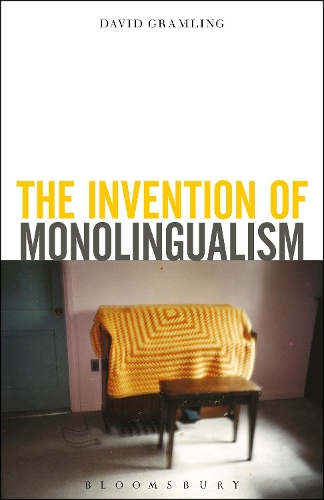
The Invention of Monolingualism
(Hardback)
Available Formats
Publishing Details
The Invention of Monolingualism
By (Author) Dr. David Gramling
Bloomsbury Publishing PLC
Bloomsbury Academic USA
6th October 2016
United States
Classifications
Professional and Scholarly
Non Fiction
Literary theory
Linguistics
809
Physical Properties
Hardback
272
Width 140mm, Height 216mm
458g
Description
Winner of the 2018 Book Award awarded by the American Association for Applied Linguistics The Invention of Monolingualism harnesses literary studies, applied linguisitics, translation studies, and cultural studies to offer a groundbreaking investigation of monolingualism. After briefly describing what "monolingual means in scholarship and public discourse, and the pejorative effects this common use may have on non-elite and cosmopolitan populations alike, David Gramling sets out to discover a new conception of monolingualism. Along the way, he explores how writersTurkish, Latin-American, German, and English-languagehave in recent decades confronted monolingualism in their texts, and how they have critiqued the World Literature industrys increasing hunger for translatable novels.
Reviews
The Invention of Monolingualism is an engaging, well written, and carefully researched book. Gramling combines work in applied linguistics, literary studies, musical theory, and citizenship studies in a way that is genuinely and deeply transdisciplinary. Its arguments are groundbreaking, offering a provocative and timely commentary on the lack of theoretical engagement with monolingualism as a social and political force. The book has considerable significance not only for applied linguistics but other fields that are affected by the ongoing normative influence of monolingualism. - * AAAL Book Award Committee *
An extraordinary and illuminating book, spanning literary and cultural studies, applied linguistics, social and cultural theory, and more. Original, brilliantly presented, provocative, and extremely timely, The Invention of Monolingualism is likely to be a blockbuster with its far sighted argumenta little in the vein of Michel Foucault's The Order of Things in terms of scope and boldness. It will be of great interest to not only literary and cultural studies readers, but also to applied linguists and social scientists as well. * Claire Kramsch, Professor of German and Education, University of California, Berkeley, USA *
A seminal work on the presentation and analysis of the complex concept of monolingualism. * BAAL Newsletter *
Every now and then a book comes along which is simply compelling with its breadth and depth of argument, its dazzling examples and its sheer boldness of vision. This is one of the most important books to be written on languages, monolingualism and multilingualism I have read. It will make you think about monolingualism and about languages in quite new ways. * Alison Phipps, Professor of Languages and Intercultural Studies, University of Glasgow, UK *
Gramlings presentation of a subtle and nuanced approach to understanding monolingual modes and mediums of communication constitutes a significant contribution to the fields of linguistic and literary studies, and has a particular interest for scholars of comparative literature, who tend to work in monolingual terms with translated texts. * OCCT Review *
The Invention of Monolingualism will be of interest not only to sociolinguists intent on studying or critiquing monolingualism but more broadly to those wishing to expand their epistemological purview of what constitutes a language or perhaps even language in the first place. * Journal of Sociolinguistics *
As links between language and identity continue to receive increased scrutiny, there is a pressing need to understand the functioning and indeed, as David Gramling suggests the invention of monolingualism as an ideology. Drawing on material from history, literature and policy, this compelling book explores how multilingualism has been disciplined in monolingual ways This book is essential reading across Arts and Humanities disciplines, especially those traditionally limited to monolingual ways of thinking. * Arts and Humanities Research Council *
Author Bio
David Gramling is Associate Professor and Director of Graduate Studies in the Department of German Studies at the University of Arizona, USA. His research focuses on the intersections of social multilingualism, literary translation, mass migration, queer studies, nationalism, and critical theory. With Deniz Gktrk, Anton Kaes, and Andreas Langenohl, he is co-editor of two major sourcebooks on migration and multiculturalism in Germany since 1955: Germany in Transit (2007) and Transit Deutschland (2011). He is also a working literary translator, and a member of the American Literary Translators' Association.
